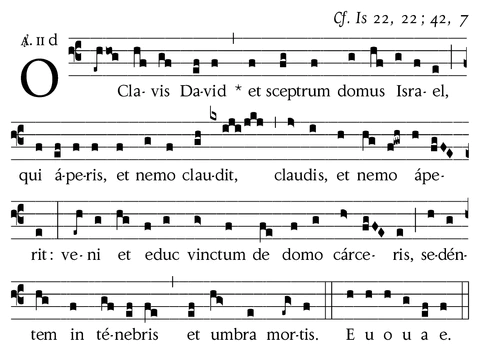
You can hear this antiphon sung first in Latin then in English at
O Key of David and sceptre of the House of Israel,
You open and none can shut,
You shut and none can open,
Come and lead the prisoners from the prison house,
Those who dwell in darkness and the shadow of death.
O Key of David (Isaiah 22:22)
You open and none can shut, you shut and none can open (Isaiah 22:22)
Come and lead the prisoners from the prison house (Isaiah 42:7)
Those who dwell in darkness and the shadow of death. (Luke 1:79)
At first glance, this appears to be a rather odd antiphon for Advent. Leave aside for the moment
the likely unfamiliar notion of David’s keys. In the runup to Christmas, why is there this
emphasis on those who are imprisoned by death? This is a theme more usually associated with
what the Apostles’ Creed refers to as Jesus’ descent to the place of the dead (see 1 Peter 3:18-
19). This is the focus of the celebration of Holy Saturday. The antiphon reminds us, however,
that the trajectory of Advent through Christmas is not one of simple recollection of the
historical event of Jesus’ birth. Even unbelievers can perceive that birth. Faith, on the other
hand, celebrates the birth as the beginning of the action which will bring humankind back to
God. “And the Word became flesh and lived among us…to all who received him, who believed
in his name, he gave power to become children of God” (John 1:12, 14). The icon of the
resurrection depicts Jesus’ descent to the place of the dead. The gates of death lie broken in
the shape of a cross beneath his feet. He grasps Adam and Eve by the hand to set them free. In
the background are other holy people of Israel. Christ’s victory extends through time, both
before and after his earthly ministry.
The significance of this action is unlocked, so to speak, by the reference in Isaiah 22 to the key
of David, specifically the key to the king’s palace. To be the keeper of that key was an important
role, a trust that had been abused by one Shebna who was then replaced by Eliakim.
The image of this key is picked up later by John, the seer of Patmos, who proclaims to the
church of Philadelphia:
“These are the words of the holy one, the true one,
who has the key of David,
who opens and no one will shut,
who shuts and no one opens:
I know your works. Look, I have set before you an open door, which no one is able to
shut. I know that you have but little power, and yet you have kept my word and have
not denied my name” (Revelation 3:7-8).
Now Jesus holds the key to the heavenly kingdom. The door remains open to the Philadelphians
because of their faithful proclamation of Jesus. Earlier in the book of Revelation, John declares
“When I saw him, I fell at his feet as though dead. But he placed his right hand on me,
saying, ‘Do not be afraid; I am the first and the last, and the living one. I was dead and
see, I am alive forever and ever; and I have the keys of Death and Hades’ (Revelation
1:17-19).
Death asserts that all lives, all loves, all effort and action are ultimately meaningless for all go
into oblivion. The Christian proclaims, however, that Christ has conquered death. With this
conquest comes a whole new attitude to life. All the good things of this world, though passing
and fleeting, are splintered shards of the great glory held in the eternity of God.
The liturgy of Christian death begins every Sunday as the Church begins its feast day; it begins
especially in the joy of Easter. The whole life of the Church is in a way the sacrament of our
death, because all of it is the proclamation of the Lord’s death and the confession of his
resurrection. And yet Christianity is not a death-centred religion. To be Christian, to believe in
Christ, means and has always meant this: to know in a way beyond reason and yet absolutely
certainly, by faith, that Christ is the Life of all life, the he is Life itself, and therefore, MY life. “In
him was life; and the life was the light of all people” (John 1:4).
The starting point for faith is not “belief”; it is love. In itself and by itself all belief is partial,
fragmentary, fragile, “For now we know in part, and we prophesy in part. Whether there be
prophecies, they shall fail; whether there be tongues, they shall cease; whether there be
knowledge it shall vanish away.” Only “love never fails” (1 Corinthians 13:9, 13). The love of
God in Christ is the key that sets us free from sin and death.
Kevin+

Recent Comments